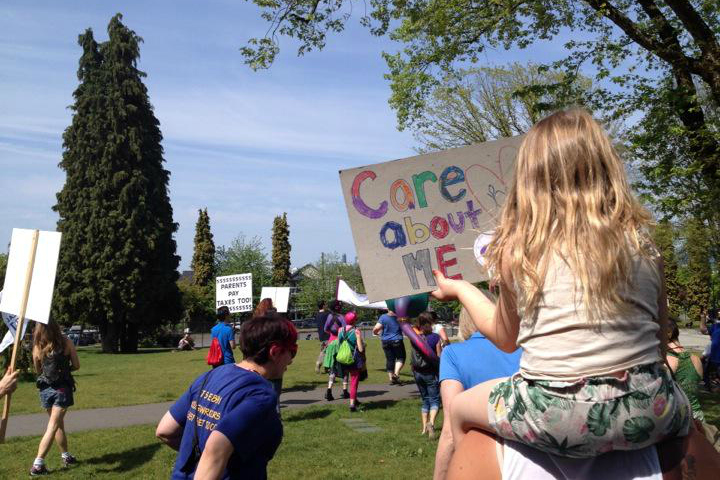Child care and parental leave were a big theme of the election campaign, with the Liberals speaking of an 18-month leave for new parents and the NDP pledging affordable child care for all.

So far, there’s been little progress on either front. But could the 2017 budget change that?
READ MORE: How the 2017 federal budget could affect your wallet
Of course, the government remains tight-lipped about what will be in its next spending plan, due to be announced on March 22, but family and child care advocates expect some bold moves in at least some of the following areas:
Child care funding
According to sources familiar with the current budget machinations, the government is ready to make a multi-year commitment to pumping more money into the country’s child care systems.
READ MORE: Child care in Canada expected to get long-term funding in federal budget
It’s not clear just how much money is at stake, but those in the sector with knowledge of the government’s thinking expect that the March 22 budget will extend the $500 million pledged for fiscal 2017-18 into an annual commitment over 10 years.
If that’s truly the amount of funding the Liberals are considering, “I don’t think we would see a perceptible impact on child care costs,” Barbara Byers, secretary-treasurer of the Canadian Labour Congress, told Global News.
The NDP’s plan, which promised $15-a-day child care, entailed spending $5 billion per year on one million new and existing child care spots.
Quebec’s universal child care system, where care costs up to $20 per day, costs around $2.2 billion a year.
But federal funding could be a first step
Still, that $500 million per year could be seed money for broad negotiations between Ottawa and the provinces, mirroring the approach the Liberals took with health care spending, said Nora Spinks, CEO of the Vanier Institute of the Family.
READ MORE: No final agreement yet in Nova Scotia health care deal announced in December
The 2016 federal budget committed $400 million to child care — as well as another $100 million for indigenous child care — beginning in fiscal 2017-18. The money was considered an incentive to encourage the provinces and territories to negotiate a national framework on early learning and child care.
WATCH: Foster parents with decades of experience in caring for at-risk children are speaking out, and questioning the government’s decision to return a nine-year-old boy to his birth mother.

Parental leave and benefits
Here the government has been toying with at least three ideas:
- Stretching parental leave and benefits from the current 12 to 18 months
- Allowing parents to take benefits and unpaid leave in smaller chunks over a period of up to 18 months
- Allowing pregnant women to access maternity leave and benefits earlier for health and safety reasons
Part of the rationale for the first two proposals is to reduce the demand for child care spots for infants under 18 months, which require a higher ratio of adults to children and are generally more expensive than spots for toddlers, said Spinks.
But both plans have prompted significant pushback, said the CLC’s Byers.
READ MORE: 25 groups issue open letter to Justin Trudeau over extended maternity leave proposal
18-month leave
The Liberals’ proposal to extend parental leave to 18 months would stretch the current overall amount of benefits over a longer period of time, resulting in smaller paycheques for moms and dads taking time off work.
Currently, parents living anywhere other than Quebec receive EI payments equivalent to 55 percent of employment earnings, up to a maximum of $537 per week.
As it is, “it’s not like they’re jetting off to the Bahamas every second weekend,” noted Byers.
Many low-income parents are already forced to return to work earlier because they can’t make ends meet under the current system, she added.
READ MORE: Should Canada rethink its parental benefits system? Report calls for total overhaul
Parental leave in blocks
The idea of having parents take leave, then come back to work for a few months, then leave again had few fans among employers and unions, said Spinks.
Finding and training a replacement for a parent who will be gone for a year generally makes sense, said Spinks. But if the absence is shorter and repeated, that becomes more challenging.
READ MORE: Parents who lose their baby being forced back to work too soon: Conservative MP
Going on EI earlier
The third idea is to let pregnant women who face health and safety risks at work receive benefits earlier than the current eight weeks before their child’s due date.
However, the government notes, “this would result in fewer weeks of benefits available after the birth of the child.”
Flexible work
Another idea the Liberals have floated is changing the Labour Code to allow employees to ask for flexible work arrangements.
The amendments would stop short of making it mandatory for employers to grant such a demand. But companies that deny the request would have to formally justify their decision.
— With files from the Canadian Press




Comments